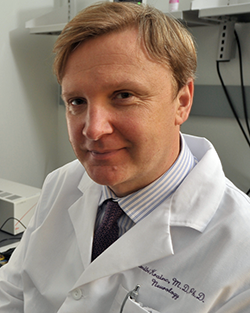Restoring contacts between mitochondria and lysosomes improves neuronal function

Northwestern Medicine scientists have uncovered a new mechanism by which mutations in a gene, parkin, contribute to familial forms of Parkinson’s disease. The discovery opens a new avenue for Parkinson’s therapeutics, scientists report in a new study published in Science Advances.
The Northwestern scientists discovered that mutations in parkin result in a breakdown of contacts between two key workers in the cell – lysosomes and mitochondria.
Mitochondria are the main producers of energy in cells, and lysosomes recycle cellular debris that accumulates during normal function of our cells. These organelles are especially important in our brains because neurons are highly dependent on energy production by mitochondria, and because of their activity, neurons produce an abundance of cellular debris that must be cleared by lysosomes.
In a prior study, published in Nature, Dimitri Krainc, MD, the chair and Aaron Montgomery Ward Professor of Neurology and director of the Simpson Querrey Center for Neurogenetics, and his group discovered that lysosomes and mitochondria form contacts with each other. After the initial discovery, Northwestern scientists tried to understand the function of these contacts in Parkinson’s disease.
In the new study, investigators report that lysosomes help mitochondria by providing key metabolites for their function. Mitochondria must import many of their essential ingredients, but it has not been well-known where some of these metabolites come from. On the other hand, lysosomes serve as recycling factories in cells and, therefore, produce many breakdown products that could be used by other organelles such as mitochondria.
In this work, scientists found that lysosomes provide important amino acids that support the function of mitochondria. However, they also found that in some forms of Parkinson’s disease, lysosomes cannot serve as a “helping hand” to mitochondria because the contacts between the two organelles are disrupted. This results in dysfunctional mitochondria and ultimately degeneration of vulnerable neurons in Parkinson’s disease.
“Findings from this study suggest that dysregulation of mitochondria-lysosome contacts contributes to the Parkinson’s disease pathophysiology,” said Krainc, the study’s corresponding author. “We propose that restoring such mitochondria-lysosome contacts represents an important new therapeutic opportunity for Parkinson’s disease.”
From a broader perspective, this study opens a new avenue of research in neurodegenerative disorders, by highlighting the importance of direct communication and collaboration between cellular organelles in the pathogenesis of these disorders.
The first author of the study is Wesley Peng, MD, PhD, who recently completed the Medical Scientist Training Program at Northwestern and currently serves as a neurology resident at Mass General Brigham and Harvard Medical School. Other contributors to the study include Leonie Schroder, Pingping Song, PhD, research assistant professor of Neurology in the Division of Movement Disorders; and Yvette Wong, PhD, assistant professor of Neurology in the Division of Movement Disorders.
The study was supported by the following National Institute on Aging grant AG066333, National Institute of Neurological Disorders and Stroke (NINDS) grants NS109252 and NS122257, all from the National Institutes of Health.






